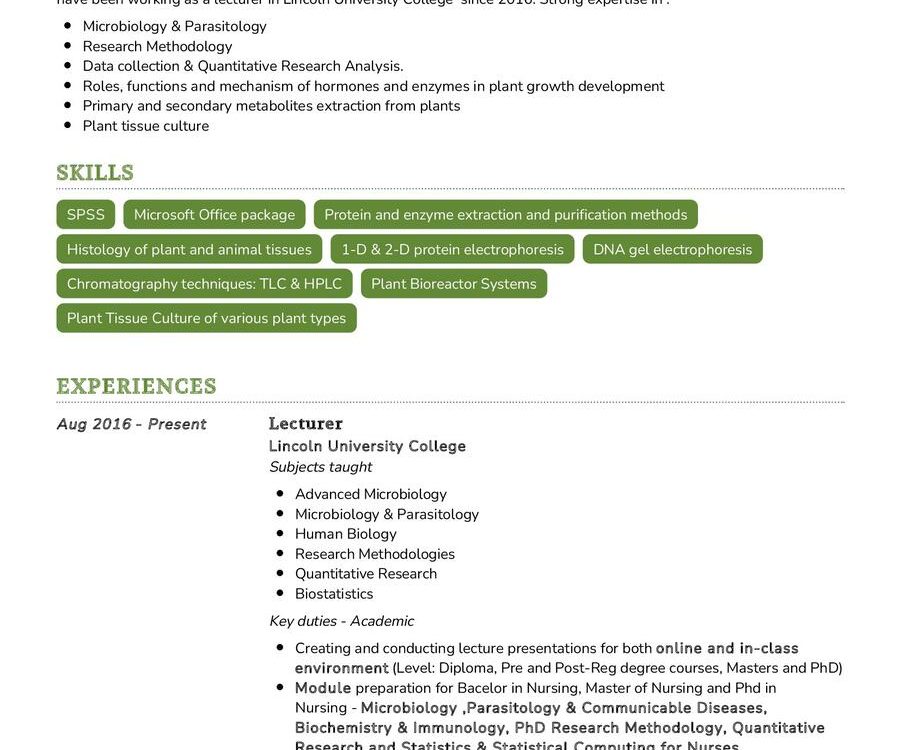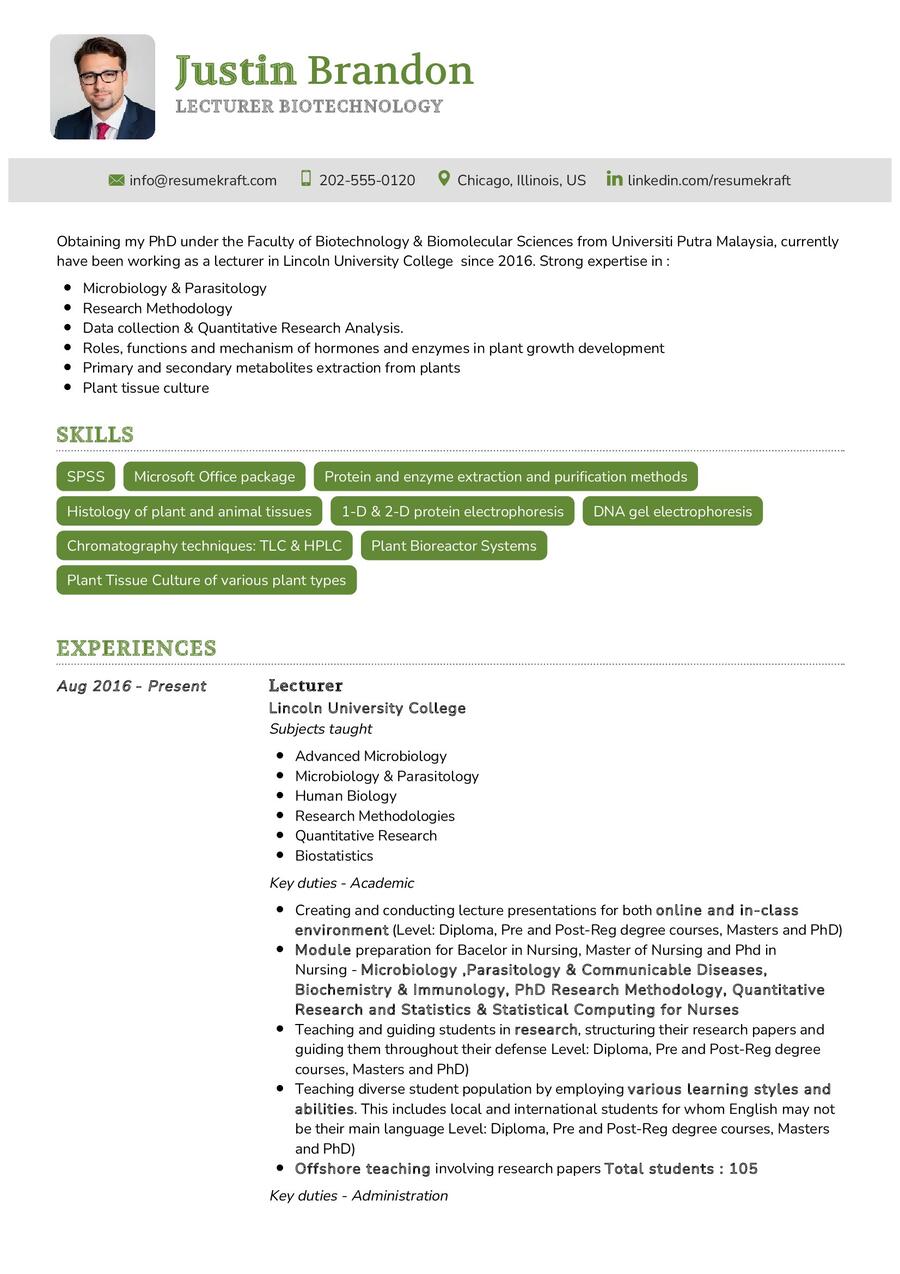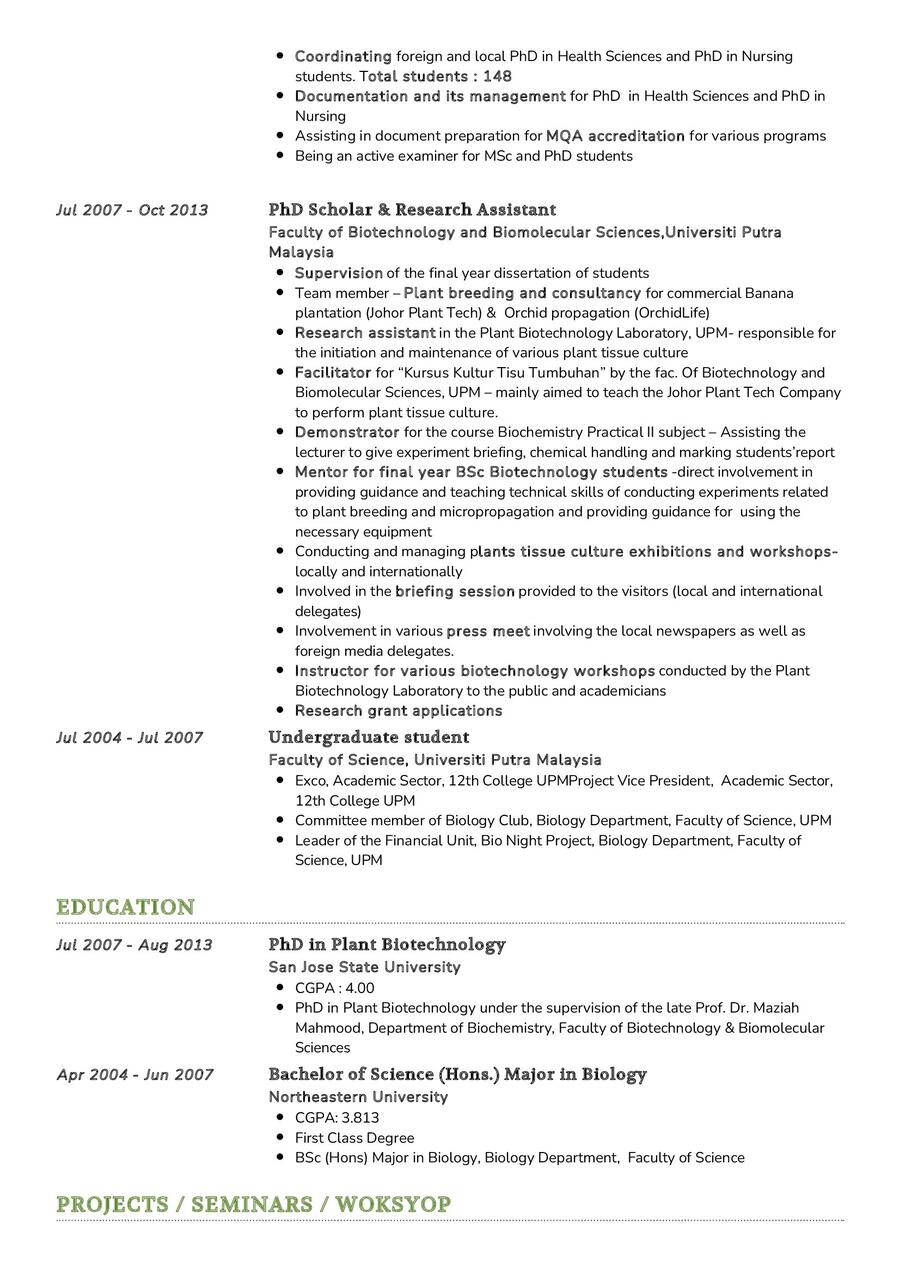Exploring the Role of a Lecturer in Biotechnology
As advancements in biotechnology shape the future, the role of a Lecturer in Biotechnology becomes increasingly vital. This position blends profound subject expertise with effective teaching skills, playing a crucial role in nurturing the next generation of biotechnologists. Let’s delve into the multifaceted responsibilities and requirements of a Lecturer in Biotechnology, a role that demands a deep understanding of biotechnological concepts coupled with the ability to impart knowledge effectively.
Key Responsibilities of a Lecturer in Biotechnology
A Lecturer in Biotechnology is entrusted with the responsibility of delivering comprehensive lectures, conducting practical sessions, and guiding students through the intricacies of biotechnological principles. This role extends beyond the classroom, involving curriculum development, research supervision, and fostering a conducive learning environment. Let’s break down the key responsibilities that define the role:
- Designing and delivering lectures on various biotechnological topics, ensuring clarity and engagement.
- Conducting hands-on laboratory sessions, providing students with practical insights into biotechnological techniques.
- Supervising student research projects, guiding them in exploring innovative solutions and applications in biotechnology.
- Contributing to the development of curriculum materials, ensuring alignment with industry trends and advancements.
- Mentoring and advising students, fostering their academic and professional growth in the field of biotechnology.
- Engaging in research activities, contributing to the academic community’s knowledge base and staying current with industry developments.
Each responsibility is a thread in the tapestry of a Lecturer’s contribution to the realm of biotechnology education.
Requirements for a Career as a Lecturer in Biotechnology
Becoming a Lecturer in Biotechnology requires a combination of educational qualifications, subject expertise, and effective teaching skills. Let’s explore the key requirements for this rewarding career:
- Hold a Ph.D. or Master’s degree in Biotechnology or a related field, showcasing a strong academic foundation.
- Demonstrate in-depth knowledge of biotechnological concepts, methodologies, and their real-world applications.
- Possess effective communication and presentation skills to deliver lectures and engage students.
- Show a track record of research publications and contributions to the biotechnological field.
- Display a passion for teaching and mentoring students, fostering an inclusive and supportive learning environment.
- Stay abreast of the latest developments in biotechnology, ensuring relevance and currency in educational content.
Securing additional certifications or attending workshops in pedagogy can enhance your profile in the competitive field of academia.
Crafting an Impressive CV for a Lecturer in Biotechnology
Your CV is a crucial tool in showcasing your qualifications and experiences as a Lecturer in Biotechnology. Here are some tips to help you create a standout CV:
- Highlight your educational qualifications, emphasizing your advanced degrees and any notable academic achievements.
- Showcase your research publications, conference presentations, and any contributions to the biotechnological field.
- Detail your teaching experience, including the courses you’ve taught and any innovative teaching methods or materials you’ve developed.
- Include any leadership roles or responsibilities you’ve undertaken within academic institutions or research projects.
- Quantify your impact where possible, such as the number of students mentored, successful research projects supervised, or improvements in student performance.
Your CV is not just a document; it’s a reflection of your expertise and passion for biotechnology education.
Preparing for the Lecturer in Biotechnology Interview
Successfully navigating a Lecturer in Biotechnology interview requires preparation and a clear understanding of the expectations. Here are some key tips to help you excel in your interview:
- Research the institution thoroughly, understanding its values, academic focus, and any recent achievements or initiatives.
- Be prepared to discuss your teaching philosophy, including how you engage students, promote active learning, and assess student understanding.
- Showcase your research contributions, emphasizing how your work aligns with current trends and advancements in biotechnology.
- Highlight any collaborative projects or interdisciplinary initiatives you’ve been a part of, demonstrating your ability to work in a team.
- Prepare examples of how you’ve handled challenges in the classroom or research setting, emphasizing your problem-solving and adaptability skills.
Each preparation step is a stride towards a successful interview, allowing you to present yourself as the ideal candidate for the Lecturer in Biotechnology position.
Key Takeaways for Crafting Your Lecturer in Biotechnology CV
As we conclude this comprehensive guide, let’s recap the key points to keep in mind while crafting your Lecturer in Biotechnology CV:
- Emphasize your academic qualifications and subject expertise.
- Showcase your research contributions and publications.
- Highlight your teaching experience and any innovative approaches you’ve taken.
- Quantify your impact where possible, providing evidence of your effectiveness as a Lecturer.
Remember, your CV is not just a document; it is a representation of your commitment to biotechnology education and your potential to inspire future professionals in the field.
Finally, feel free to utilize resources like AI CV Builder, CV Design, CV Samples, CV Examples, CV Skills, CV Help, CV Synonyms, and Job Responsibilities to create a standout application and prepare for the Lecturer in Biotechnology job interview.



